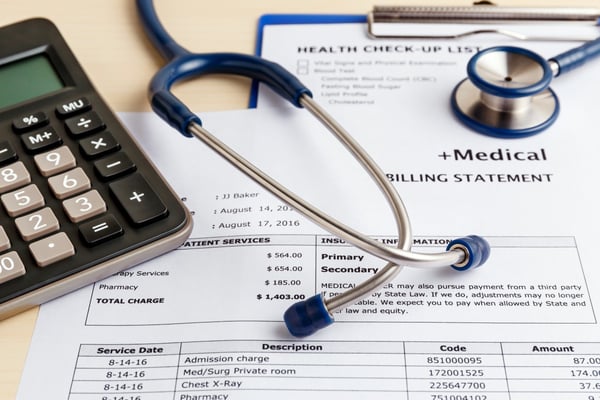Using Patient Education Videos to Support Preventive Care Strategies
As a healthcare provider, you know prevention saves lives. From routine screenings and lifestyle counseling to vaccinations and early detection,...
5 min read
Robert McDermott Jan 11, 2024 12:30:00 PM
 Nearly every healthcare practice encounters billing challenges. While there are a lot of aspects of the healthcare industry that differentiate it from other industries, revenue cycle management is still a core component of the business. However, patient care and patient experience stand in the forefront and are, often, a greater focus for healthcare providers and staff than billing or claims.
Nearly every healthcare practice encounters billing challenges. While there are a lot of aspects of the healthcare industry that differentiate it from other industries, revenue cycle management is still a core component of the business. However, patient care and patient experience stand in the forefront and are, often, a greater focus for healthcare providers and staff than billing or claims.
Still, when it comes to practice health and practice growth, getting a handle on healthcare billing is essential. That means it's critical to understand healthcare billing challenges and how to overcome them.
Quick Links
Healthcare billing plays a pivotal role in the financial health and overall sustainability of healthcare practices. In fact, efficient and accurate billing processes are essential for healthcare practices to thrive and continue providing quality patient care.
While billing is often viewed as the end of a process, the truth is it’s far closer to the middle of the revenue cycle. Billing and claims directly impact a practice’s ability to not only meet operational expenses, but also to invest in advanced medical technologies, and attract and retain skilled healthcare professionals.
Of course, one of the primary reasons healthcare billing is crucial is its direct impact on revenue generation. Medical and dental practices rely heavily on timely and accurate reimbursement for the services they provide. Proper billing ensures healthcare providers are compensated appropriately for their expertise, time, and resources invested in patient care. Without effective billing procedures, practices may face cash flow issues, making it challenging to cover operational costs such as salaries, rent, utilities, and equipment maintenance.
Moreover, an efficient billing system contributes to the overall patient experience. Clear and transparent billing processes enhance patient satisfaction and trust in the healthcare provider. Patients appreciate clarity regarding their financial responsibilities, and accurate billing helps prevent misunderstandings and disputes. Positive patient experiences contribute to the reputation of a medical or dental practice, potentially attracting new patients and fostering long-term relationships with existing ones.
Healthcare billing is indispensable for the success and viability of medical and dental practices. Beyond being a financial transaction, it is a critical component affecting the overall health of a practice, ultimately influencing its ability to provide quality care, maintain financial stability, and foster positive relationships with patients.
 Top 9 Healthcare Billing Challenges
Top 9 Healthcare Billing ChallengesDespite its essential role in your practice health, healthcare billing can be a complex process. From submitting and processing claims to billing regulations, there are several challenges healthcare providers must navigate, including:
1.Changing Regulations– The healthcare industry is subject to frequent changes in regulations and compliance requirements. Keeping up with updates to billing codes, reimbursement policies, and compliance standards is a perpetual challenge. Failure to stay current can lead to claim denials or financial penalties.
2. Coding Errors- Accurate coding, especially medical cross coding for dental, is crucial for proper billing and reimbursement. Coding errors, whether they result from outdated code sets or human mistakes, can lead to claim denials, delayed payments, or even legal issues. For many, regular training and auditing are essential tools to mitigate coding errors.
3. Claim Denials- Healthcare providers often face claim denials for a variety of reasons including incomplete information, coding errors, lack of medical necessity, or issues with eligibility verification. Reducing the rate of claim denials requires a proactive approach, including automated insurance verification, improved documentation, and effective denial management strategies.
4. Data Security and Privacy- With the increasing reliance on electronic health records (EHRs) and digital billing systems, protecting patient data is vital. Healthcare organizations must implement strong cybersecurity measures to safeguard sensitive patient information and comply with HIPAA regulations around data security.
5. Rising Costs- Healthcare billing processes can be expensive. From the costs associated with technology upgrades and staff training to compliance efforts, healthcare practices need to make significant investments in efficient billing systems. Further, training and hiring staff members to handle billing, claims, and collections can also be a drain on resources.
6. Collections- As patients assume a greater share of healthcare costs through high-deductible health plans, providers face challenges in collecting payments. Communicating effectively with patients about their financial responsibility and implementing transparent billing practices are essential for improving collections.
7. Building and Maintaining Tech Stacks- Technology can be remarkably useful for streamlining billing processes, but integrating new systems with existing workflows can be challenging. Ensuring seamless interoperability between different software platforms and EHRs is crucial to avoid disruptions in billing operations.
8. Staff Training and Retention- Healthcare billing can be complex. Therefore, it requires well-trained and knowledgeable staff. Staffing shortages, high turnover rates, and the need for ongoing training can further complicate billing operations. And yet, without training, billing processes may see increased errors and inefficiencies.
9. Value-Based Care Models- Recent shifts from fee-for-service to value-based care models are introducing new challenges in billing and reimbursement. Adapting billing processes to align with outcome-based payment models requires careful planning and implementation.
Addressing these challenges requires a multifaceted approach combining technology, education and training, compliance strategies, and a focus on patient communication, especially when it comes to out of pocket costs and billing expectations. Healthcare providers must be mindful of navigating these challenges to ensure a steady cash flow and maintain practice health.
 How to Help Solve Healthcare Billing Challenges
How to Help Solve Healthcare Billing ChallengesGiven the importance of billing for revenue cycle management, billing and claims challenges can be stressful for healthcare providers and practice managers. Similarly, it can be stressful for patients, especially with insurance changes, out-of-pocket expenses, and more. Addressing these challenges requires a multifaceted approach combining technology, communication, and policy changes.
Improve Billing Communication
One crucial step is implementing transparent and standardized billing practices. Clear and easily understandable billing statements can help patients better understand their healthcare costs and make informed decisions about their treatment. This may involve breaking down costs for individual services, providing detailed explanations of insurance coverage, and offering easy-to-access resources for patients seeking clarification.
Similarly, treatment plans can help you lay out care plans that better help patients understand treatment goals as well as potential outcomes. It also helps prepare them ahead of time for expenses moving forward.
Patient Education
Many individuals do not fully understand their insurance coverage or how to navigate the healthcare billing system. Healthcare providers can utilize current technology and industry expertise to help them quickly and accurately educate patients about their insurance plans, potential out-of-pocket costs, and available financial assistance programs. This can help patients make more informed decisions about their healthcare and avoid surprises when bills arrive, which is even more important with the 2022 No Surprises Act.
Again, automated insurance verification can help with this education as administrative staff can convey to patients, in advance of their appointments, whether a procedure or treatment is covered and what the shared expense may be.
Embrace Technology
Technology is a key strategy. More specifically, automation tools and healthcare applications can help with everything from insurance verification, clarifying costs upfront, to claims processing to improve A/R. These tools reduce the administrative burden on healthcare staff, allowing them to focus more on patient care.
Additionally, online portals can be leveraged to facilitate communication between healthcare providers and patients, enabling them to access billing information, submit documents, and ask questions conveniently.
Finally, technology can simplify the healthcare payments process as well. More specifically, leveraging online billing as well as digital payment systems can make paying securely easy for patients to do on the fly, using digital wallets they already use and trust, all while staying HIPAA compliant.
By combining transparent billing practices, technological advancements and patient education, healthcare providers can make significant strides in overcoming billing challenges while improving both revenue cycle management and the patient experience.
Choosing your technology solutions is an important business decision. Technology improvements should integrate with existing practice management software so you can avoid a major overhaul of your tech staff. They should improve efficiency and workflow while providing the HIPAA compliance you, and your patients, need.
Ready to hear more about a comprehensive solution that does all that? Get in touch with the iCoreConnect team to learn more about the iCoreEnterprise platform of cloud-based software and services designed to improve clinical workflow and practice revenue. iCoreConnect offers complete and transparent billing and claims management as well as automated insurance verification, equipping staff to accurately answer questions and provide a path forward for patients. Our goal is helping you and your staff meet your goals so you can grow. Let’s get started today!

As a healthcare provider, you know prevention saves lives. From routine screenings and lifestyle counseling to vaccinations and early detection,...

There’s no denying that the AI boom is here. The American Medical Association reports that 66% of physicians are currently using artificial...

If only managing your practice’s revenue cycle came with a crystal ball. You could spot claim denials before they happen, predict when patients might...

Healthcare is a necessity for the “customers'' and though it functions as a business, many of the practitioners never entered the field with an eye...

For many healthcare providers, staying current on professional practices is essential, but for many, payment trend watching probably wasn’t on top of...

Reality television is full of competition shows, presenting contestants with high stress challenges they must overcome. For many dental practice...